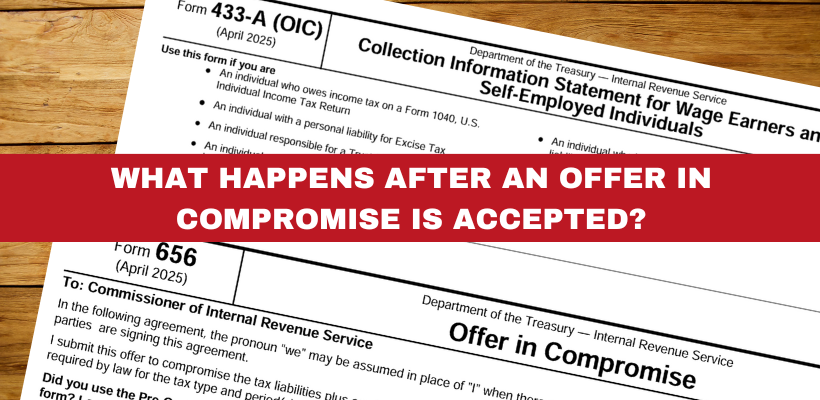Getting an Offer in Compromise (OIC) accepted by the IRS is a huge relief for anyone struggling with tax debt, as it means the IRS has agreed to let you settle your tax liability for far less than you owe. It is a significant achievement, as most taxpayers never receive this opportunity. But, while the acceptance of your offer marks a major milestone, it is not the final chapter of your tax resolution journey.
The approval of your OIC comes with its own set of rules, obligations, and timelines that you must follow carefully. These responsibilities are critical to ensuring that the IRS does not revoke your agreement or come after you for the remaining debt. It is important to understand that the relief you’ve gained through your OIC hinges on maintaining your compliance moving forward.
Here’s what happens after your OIC is accepted by the IRS.
1. You must stick to the terms of your offer.
Once your OIC is accepted, the IRS expects you to follow through exactly as agreed. This means that if you chose the lump sum option, you have to pay the full amount within five months of the acceptance date. And if you opted for monthly payments, you’ll need to follow your payment plan (often spread out over 24 months).
Missing a payment or being late could result in the IRS revoking your offer and reinstating your full original tax liability.
2. You must stay compliant for the next 5 years.
A major condition of an accepted OIC is future compliance. For the next five years, you need to file all your federal tax returns on time and pay any new taxes in full and on time.
If you don’t follow these rules, the IRS can default your agreement, meaning they can come after you for the original debt (minus what you’ve already paid). And that is the last thing you want.
3. The IRS will keep your refund for the year that your offer is accepted.
If you’re due a federal tax refund for the calendar year your offer is accepted, the IRS will apply that refund to your tax debt and not send it to you.
This won’t reduce the amount you agreed to pay in the offer. It’s simply something the IRS keeps and it’s part of the deal.
4. The IRS will release tax liens after final payment.
If the IRS filed a tax lien against you before the OIC was accepted, it won’t be removed immediately. However, once you make the final payment on your offer, the IRS will typically release the lien within 30 days.
You can also formally request a lien release by filing IRS Form 12277.
5. You must monitor your IRS account regularly to ensure that you are still in compliance with the offer.
You should keep an eye on your account to make sure everything is being processed correctly. You can do this by using the IRS online account tool. You may also request an account transcript to check your compliance status.
Staying informed is key to making sure you don’t accidentally fall out of compliance.
What happens if you default on your offer?
Even after your Offer in Compromise is accepted, it’s important to remember that the IRS can still revoke the agreement if you fail to meet the terms. Defaulting on an OIC could put you in an even worse financial situation than before your OIC was accepted. To learn more about the consequences of defaulting and what you can do if you are in this situation, check out our full blog post: What Happens If You Default on an Offer in Compromise?
Final Thoughts
An accepted Offer in Compromise gives you an opportunity to resolve your tax debt for less than the full amount owed, but it comes with long-term obligations. To protect that hard-won agreement, it’s important that you stay organized and proactive. Make sure you keep thorough records of your payments, tax filings, and any correspondence with the IRS. These documents will be essential if questions ever arise or if you need to prove your compliance. Most importantly, stay on top of your tax responsibilities moving forward. File your returns on time, pay any new taxes in full, and don’t ignore IRS notices. Staying compliant is the key to making your OIC work for the duration of the agreement.
If you’re struggling with tax debt and want to explore whether an Offer in Compromise is right for you, or if you’ve had an OIC application rejected and need guidance on what to do next, reach out to us at the Law Office of Steven N. Klitzner. We can review your situation, explain your options, and help you through every step of the process.







 Steven N. Klitzner, P.A. is a tax attorney based in Miami, Florida. He has been practicing tax law for over 40 years, and currently holds a 10.0 rating by Avvo. Mr. Klitzner was appointed to the IRS Service Advisory Council in 2021 and is...
Steven N. Klitzner, P.A. is a tax attorney based in Miami, Florida. He has been practicing tax law for over 40 years, and currently holds a 10.0 rating by Avvo. Mr. Klitzner was appointed to the IRS Service Advisory Council in 2021 and is... 





